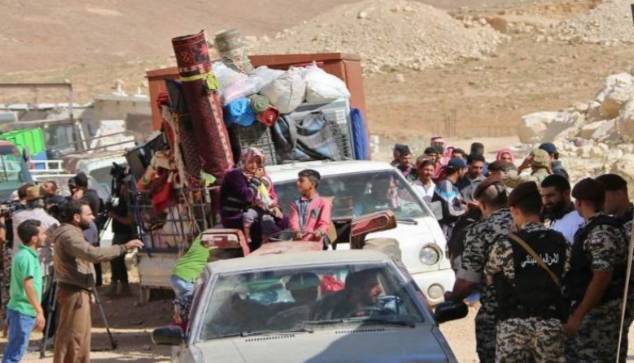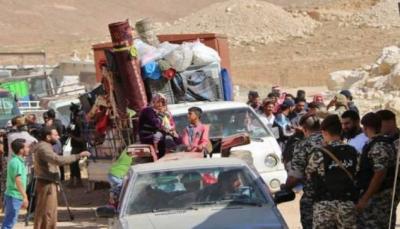Last Wednesday, the Parliamentary Committee on Foreign Affairs and Expatriates held a session in the Parliament that was different from its usual meetings, as the topic of Syrian displaced people took precedence in the discussions. According to a study by the Lebanese Foreign Ministry, the cost of this displacement has reached approximately 3 billion dollars annually. Committee Chairman MP Fadi Alama noted that the session was dedicated to the issue of the displaced and was attended by 19 ambassadors from European countries and other nations concerned with this issue. The aim was to share information regarding the meetings held with ministers and institutions related to the displacement issue, which took six months of discussions that yielded a bundle of information gathered in collaboration with the Army Command, the Intelligence Directorate, the General Security, and various authorities involved in the displacement file in Lebanon.
It was learned by "Nidaa Al-Watan" that the ambassadors present, along with their representatives, were more listeners than speakers, posing some questions, especially since they criticized the responsible and concerned Lebanese parties for the lack of a unified and accurate database regarding the displacement file and its complexities, which has been worked on during the preparation period for this meeting with the ministerial committee and the various security agencies involved.
Complementary Meetings
"Nidaa Al-Watan" also learned that this meeting will be followed by additional complementary meetings in the coming weeks, aiming to reach perhaps mechanisms that facilitate and expedite the return of the displaced to their homeland. These meetings will be held with the United Nations and other institutions that support the displaced, in preparation for issuing recommendations to both Speaker of the House Nabih Berri and caretaker Prime Minister Najib Mikati about this sensitive issue, which all Lebanese may agree on and approach differently than for the past ten years.
The committee chairman, MP Fadi Alama, revealed to "Nidaa Al-Watan" a number of facts and data regarding this file, including that the percentage of displaced persons now constitutes 30% of the residents in Lebanon, and that the annual birth rate among the displaced is now very close to that of Lebanese births. According to official Lebanese reports, the number of displaced persons is two million and 82 thousand, while the figures from the Refugee Commission indicate only 840 thousand. This discrepancy is, of course, due to the presence of illegal crossings used by the displaced to continue benefiting from the monthly assistance provided to them.
Alama noted that the meeting with the ambassadors included a detailed presentation on the geography of the distribution of displaced persons in Lebanon, with their percentages being 40% in Baalbek-Hermel, 23% in Mount Lebanon, 27% in the North, and 11% in the South. Additionally, approximately 200,000 Syrian children have been born in Lebanon since the beginning of the crisis, averaging 20,000 annually, and these figures have reportedly risen according to the latest census to reach 50,000 annual births compared to 70,000 Lebanese births.
He also discussed studies conducted on displaced persons, including one from the American University, which revealed that the average Syrian family consists of five members while the average Lebanese family has three members. Thus, if conditions remain unchanged, the proportion of displaced persons could reach 50% of the society in Lebanon within five to ten years.
Alama spoke about the security aspect, highlighting incidents of theft, murder, and drug trafficking in Lebanon, alongside the terrorist acts witnessed in the country since the onset of the Arab Spring, which resulted in numerous casualties. Statistics showed that 27% of prisoners in Lebanon are Syrian, with 48% of them being minors.
He addressed what was explained to the ambassadors regarding the presence of weapons within the displacement camps and the disputes that arise among the displaced and their neighbors from Lebanese villages and towns, noting that reports indicate the kind of weapons present confirms their easy entry and existence in the camps. All of this also puts pressure on the workings of the Lebanese judiciary.
On the political front, fear was expressed regarding the possibility of Lebanon becoming a platform for illegal immigration to Europe and a center for launching terrorist operations against it. Some western powers allegedly do not encourage the return of the displaced, a stance reflected in their support for certain programs related to social integration, which raises concerns among the Lebanese, especially noting that as of 2020, 80% of Syria is under government control, and any steps related to sanctions affect the return of displaced persons, which everyone agrees must be safe and within the frameworks defined by international law.
The treaties that Lebanon joined and signed in 1951 regarding displacement and the necessity for refugees to respect the laws of the host country were reiterated, highlighting that Article 32 gives the host country the right to return refugees to their homeland in case of violations.
Economic Situation
The tough economic reality in Lebanon was also explained, where the unemployment rate stands at 40%, with one of its causes being the presence of Syrian laborers and the operation of small competing businesses that do not pay taxes. There are statistics indicating more than a thousand unregistered companies owned by displaced Syrians. Moreover, most displaced persons do not pay fees and taxes. One study indicated that the increased cost of electricity due to the displaced has reached 350 million dollars annually, alongside an increase in water consumption between 8% and 12% annually and road usage by 50%. There is also the phenomenon of early marriage, homelessness, prostitution, and tensions between Lebanese and displaced individuals, with displaced persons benefiting from subsidized medications unlike Lebanese.
Alama clarified in his statements that the reports from the ministerial committee mentioned steps taken by the official Syrian authorities to facilitate returns, especially constructing residential complexes in destroyed areas, among other actions.
Among the conclusions presented was the need for border control and cooperation with international institutions concerned to expedite returns or even protect those displaced individuals who do not wish to return and request political asylum abroad.
Alama revealed that the majority of ambassadors who participated in this meeting confirmed that dealing with this file is not politically motivated but that they support returns once conditions mature at the educational, health, and social levels. He noted that these ambassadors encourage Lebanon to engage with the United Nations and communicate with the Syrian government to facilitate returns, with the European Union expressing readiness to assist in border control.
In conclusion, some of the ambassadors separated the issue from politics, stating that they provide aid to the most vulnerable regardless of nationality or displacement status. However, follow-up requires unifying information and maintaining international communication with Syria, as further crises in Syria will increase the number of displaced persons and exacerbate the crisis.




